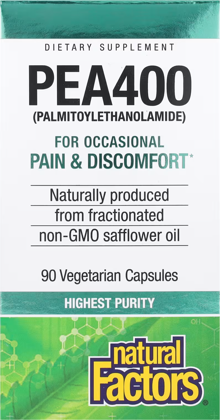
Natural Factors PEA400
Go to Store| Serving Size: 1 Capsule | ||
| Servings Per Container: | ||
| Amount Per Serving | % DV * | |
| Palmitoylethanolamide (PEA)(safflower oil) (seed) | 400mg | ** |
|
* % Daily Value (DV) is based on a 2,000 calorie diet. Your daily values may be higher or lower based on your calorie needs.
† Daily Value (DV) not established. |
||
|
Other Ingredients: Contains no artificial colors, preservatives, or sweeteners; no dairy, starch, sugar, wheat, gluten, yeast, soy, corn, egg, fish, shellfish, animal products, salt, tree nuts, or GMOs. |
||
|
Warnings: Sealed for your protection. Do not use if seal is broken. For freshness, store in a cool, dry place. As with any supplement, consult your health professional before use if you are pregnant, breastfeeding, or trying to conceive, or if you are taking medication, have a medical condition, or anticipate a surgery. Keep out of the reach of children. |
||

Natural Factors PEA400
Go to Store- Dietary Supplement
- (Palmitoylethanolamide)
- For Occasional Pain & Discomfort
- Naturally Produced from Fractionated non-GMO Safflower Oil
- Highest Purity
- Suitable for Vegetarians/Vegans
The Power of PhytoResponse
PhytoResponse refers to plant foods and herbs that can modulate and positively influence the Endocannabinoid System (ECS) directly or indirectly and support the body’s production of endocannabinoids with non-cannabis, plant-based botanical compounds.
ECS It's all about Balance.
The ECS promotes homeostasis, or balance, which is what being healthy is all about.
The Power of PEA and the Endocannabinoid System
PEA (N-palmitoylethanolamide) is an endogenous fatty acid amide that belongs to the family of biologically active lipids that are increased by the body to soothe discomfort. PEA is a member of the ECS with several biological functions, including neuromodulatory activity in the central nervous system. It has been demonstrated to be effective on the different inflammatory mechanisms that develop and maintain both neurogenic and neuropathic pain.
Pure PEA
There are two sources of PEA commercially available. Synthetic forms require the use of powerful synthetic solvents. PEA can be naturally derived from safflower oil. PEA400 only utilizes naturally derived palmitoylethanolamide from safflower seed.
PEA (palmitoylethanolamide) is a fatty-acid-like compound naturally found in foods. Natural Factors PEA is naturally produced from fractionated non-GMO safflower oil. It then undergoes a micronization process for improved solubility and absorption. PEA has been shown to be helpful in managing occasional pain and discomfort.
Isura:
Non-GMO: Documentation
Mass Spec: Lab Tested



